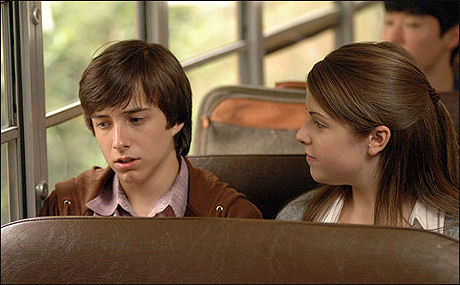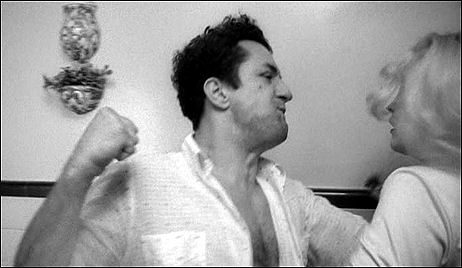Film scores and their composers (and their relationships with directors) could make for a fascinating multi-part series. It’s therefore dispiriting to read that Dan Lieberstein‘s Lights! Action! Music!, a doc that airs tonight on New York’s WLIW , is, in the opinion of N.Y. Times critic Stephen Holden, “a fluffy, disorganized, woefully incomplete compendium of interviews and film clips about movie music…a sampler for a larger and deeper exploration….even on its own terms, a frivolous diversion.”
wired
Rocket Science shout-out
“One of the pleasures of Jeffrey Blitz‘s film is that it immerses us in the fraught, competitive pressures of the high-school debate world — like Spellbound, it gets the details right. Blitz’s brainy kids, who run the gamut from the pathetically awkward to the brazenly self-assured, are a far cry from the usual horny adolescents Hollywood comedies serve up to flatter their target audience. They’re no less hormonal, but a lot more human.” — from David Ansen‘s review of Rocket Science (Picturehouse, 8.10).

Global Warming Denial
“If you think those who have long challenged the mainstream scientific findings about global warming recognize that the game is over, think again. Yes, 19 million people watched the ‘Live Earth’ concerts last month, titans of corporate America are calling for laws mandating greenhouse cuts, ‘green’ magazines fill newsstands, and Al Gore’s An Inconvenient Truth won an Oscar. But outside Hollywood, Manhattan and other habitats of the chattering classes, the denial machine is running at full throttle — and continuing to shape both government policy and public opinion.” — from an 8.13 Newsweek piece by Sharon Begley about the global-warming denial crowd, and the ample funding behind them.
Coarse hedge-funders
Tom Wolfe‘s “The Pirate Pose,” a Conde Nast Portfolio piece about the coarse (and in some cases appalling) social profiles of hedge-fund multi-millionaires, the 21st Century masters of the universe, is an amusing, well-composed read. It was clear two years ago that the hedge-funders were the eager-beavers one needed to talk to about independent movie financing, website-purchasing and any other mode of financial entertainment-industry investment, but I wonder what the very latest tea-leaf reading may be in this realm.
“The collision of new money and old money or, to be more accurate in our American context, slightly older money, has been a recurring drama,” Wolfe notes early on. “At the turn of the 20th century, Edith Wharton established herself as perhaps America’s greatest female novelist by focusing on precisely that. But the current new breed stands apart from all the rest for two reasons.
“First, they have more money, infinitely more, than any of the various waves of new money that preceded them, with the possible exception of robber barons on the order of John D. Rockefeller, who, incidentally, was regarded as a rude Pocantico hillbilly Baptist by society in New York a hundred years ago. Second, hedge fund managers are possessed by a previously unheard-of status fixation.”
And I love this graph about a certain coloration of hedge-fund multi-millionaire trophy wives, whom Wolfe describes in aggregate terms as “Twinkies”:
“The twinkies who have their eggs fertilized by their husbands’ sperm in a laboratory, creating embryos for implantation in the wombs of surrogate mothers who are paid to manufacture children for delivery in nine months, since why on earth should any wife whose husband is worth a billion or even $500 million have to endure the distended belly, bilious mornings, back cramps, not to mention a cramped social life, to end up with her perfect personal-trainer-sculpted boy-with-breasts body she has spent thousands of sweaty hours attaining, ruined… tempting her husband to survey all the little man-eaters out there, including those former wives who used to meet regularly at the Boxing Cat Grill until it burned down, whereas the current wives leave their husbands catatonic before the plasma TV and meet three or four times a week at one local bar or another and drive home in their Hummers and bobtail Mercedes S.U.V.’s, bombed out of their minds, while waiting for the baby to come from the factory…”
I’m now searching around for two or three easy-reading columnists who’ve been keeping tabs on hedge-fund investment activity in the entertainment industry and reporting about it in layman’s terms, and if anyone has any tips…
“Yuma” boy
What’s with the slightly bent left leg? Again — the guy looks like a dancer in a rehearsal hall on West 45th Street going over his moves as a hot gunslinger in a B’way musical called Yuma Boy. Seriously… what is it with Lionsgate’s creative ad guys and their gay-appealing (or at the very least flagrantly metrosexual) ad campaign for James Mangold‘s allegedly gritty, unaffected, very down-to-it western?

The only thing missing in this shot is a ballet bar — snapped Sunday, 8.5.07, 5:40 pm near the corner of Cole and Sunset.
One look at the trailer tells you there’s nothing Michael Bennett or Bob Fosse-ish about this film whatsover. Mangold is a gifted craftsman who knows exactly what he’s doing and I’ve heard nothing but very good things about the film, so I’m trying to forget the ads and just wait for the movie, but those Lionsgate marketers keep messing with my head.
Siskel, Ebert, “Full Metal Jacket”
Watch this 20 year-old clip of Roger Ebert and the late Gene Siskel reviewing Full Metal Jacket. Listen to Ebert call it “disappointing…too little and too late…doesn’t compare favorably to Platoon,” and then to Siskel saying he “liked the whole film…it’s full of great scenes.”
Shitty “Bull” sound
Every now and then someone writes a looking-back-on-Raging Bull piece (like this one from the Guardian‘s Ryan Gilbey, a nod to the film’s re-release in England on 8.17). And they all report that Martin Scorsese‘s classic wasn’t tremendously popular critically or commercially when it first opened in November of 1980. But what’ s never mentioned is that moviegoers couldn’t hear many of the quieter dialogue scenes with any real clarity, even in the better big-city theatres. And that this almost surely had an effect upon the general reception.

I distinctly remember watching a public screening of Raging Bull in the Sutton Theatre on 57th Street just before Thanksgiving, and leaning forward and cupping my ears and getting angry as I asked myself, “Dammit, why don’t they turn the damn sound up?” I had this reaction every time Robert De Niro, Joe Pesci or Cathy Moriarty were murmuring or muttering their thoughts in their middle-class Bronx apartments, or when “Tommy” the mafia guy was laying things out in his two quiet scenes.
Raging Bull‘s sound was apparently rendered with an intentionally murky-crude quality so it would seem unaffected and working-classy — the idea being that naturalism was equivalent to a kind of aural muck. This almost certainly resulted in tens of thousands of ear-cuppings across the nation given that the sound systems in all but a few big-city theatres back then were atrocious, for the most part. By today’s standards, it was truly the aural Dark Ages.
This sound issue is briefly addressed in the commentary track on the special edition DVD came out in ’05.
I would guess that the murky sound issues probably turned a few people off when it came to recommending Raging Bull to their friends, and that it probably affected the opinions of some critics, if only on a subliminal level. If you can clearly hear what’s being said in a film or a play, you’ll mainly respond to what’s being said — to the content. But if it’s a chore to hear this, then a percentage of critics are going to inwardly say to themselves “fuck this.” And I don’t blame them. So the responsi- bility for Raging Bull‘s underwhelming reception 27 years ago must fall squarely on the shoulders of director Scorsese and editor Thelma Schoonmaker.
I never really heard Raging Bull properly until it came out on laser disc in the early ’90s, and it didn’t sound really great until the special edition DVD hit stores two years ago.
Freaks and Geeks
“In the last few decades the emergence of a geek elite has helped legitimize [an] outsider culture and helped bring legions of 97-pound weaklings into the sightlines of the industrial entertainment complex,” writes N.Y. Times critic Manohla Dargis in a late-to-the-table but remarkably perceptive Comic-Con piece that went up on 8.3.

“In some respects America is now a country of freaks and geeks, self- professed outsiders who imagine themselves somehow different from the herd, perhaps because they are Americans — radical individuals who are united if only by their increasingly narrow interests and obsessions.
“This kind of atomization of the culture has its problems, as we know deep in our bones. Yet for all my worries that we are turning into a nation of iPod people, that√ɬ¢√¢‚Äö¬¨√¢‚Äû¬¢s only part of the big, postmodern, late-capitalism picture. Despite all the plastic and dissembling, events like Comic-Con represent something genuine and true and, yes, powerful about how people live in the modern world.
“Every day we wake up to navigate through a faceless, inhuman, Made-in-China existence. Some of us escape through literature, some of us burrow deep into movies. And some of us find sweet relief in what, to the outside world, looks entirely disposable, useless and — here√ɬ¢√¢‚Äö¬¨√¢‚Äû¬¢s that word again — childish.”
Another “Bourne” report
My box-office guy is telling me The Bourne Ultimatum earned $25,437,000 on Saturday. That’s a 3% increase over Friday, which is especially impressive considering that Friday’s total included a number of Thursday midnight shows. Tonight’s final count, I’m told, will be in the vicinity of $70,181,000, or about a million less than Steve Mason‘s prediction of $71,250,000.
Aspiring Crack Addict on Ratner
Of all the flying-mud comments posted about my response piece to Scott Foundas‘s L.A. Weekly Brett Ratner profile, the best was from “aspringcrackaddict”, to wit: “The only other thing I can say about [Ratner’s] movies is that they look like movies, they move like movies and they sound like movies, but I’ll be damned if you can find a real movie in there.”
Zampano vs. Il Matto
As I was re-watching that beautiful Criterion DVD of Federico Fellini‘s La Strada a couple of weeks ago (for Jett’s benefit, as I felt he was now, at age 19, old enough to get it), I suddenly detected a striking parallel between my soured relationship with MCN’s David Poland and the one between the irreverent, philosophical-minded tightrope walker who is inaccurately called “Il Matto” (Richard Basehart) and the humorless and brutish Zampano (Anthony Quinn). Basehart confesses to Guilietta Massina at one point that he can’t help provoking or making fun of Zampano, even though he knows he may be putting himself in harm’s way by doing so. This exact same observation is made by Martin Scorsese in the video doc that accompanies the film. It’s odd how films, even ones you think you know backwards and forwards, sometimes pass along these little moments of clarity.

